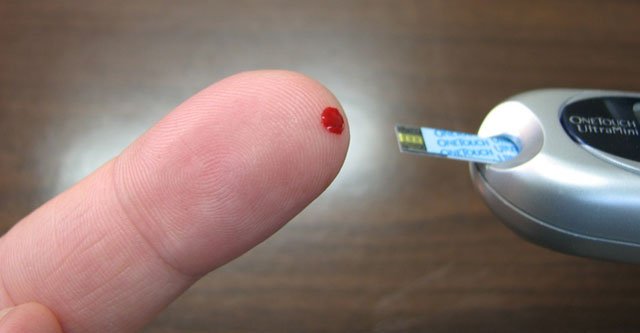Last Updated on July 31, 2021 by Dr Sharon Baisil MD
Most of the diabetes test requires fasting. One such test is the fasting blood sugar test(FBS).
It indicates whether the person has acquired diabetes or not. It also dictates the possibility of the person acquiring the disease.
However, some tests can be done without having to undergo any fasting period.
How many Hours of Fasting is Ideal for FBS Test?
In the fasting blood sugar test case, about 8 hours of fasting is required before performing this test. This is done to receive accurate results. If you accidentally eat or drink anything other than water during your fasting period, results will be affected. Reschedule your test in such a case.
To give you clear answers regarding the fasting blood sugar test concept, let’s dig a little deeper and bring detailed methodology and analyze the test into the spotlight.
What Are Fasting Blood Sugar Levels(FBS)?
Fasting blood sugar levels gives reliable information about how a patient’s body is managing the sugar. When these levels are high, it shows low insulin sensitivity or hyperglycemia, whereas a dip in these levels conveys that a person is hypoglycemic.
Fasting blood sugar levels are determined by three elements:
- Components of a person’s last meal
- Size of the person’s last meal
- Body’s response to the insulin
The blood sugar levels are always raised after meals. Why? Okay, let us comprehend this in an easy way.
__________________________________
⭐ Check out this Flipbook with 30-Day Diabetic Meal Plan based on Foods from Each Indian State ⭐
(click on the ▶ arrow below to scroll the pages and 🔍 button to enlarge)
_____________________________
The food we eat is first digested by enzymes and then absorbed by all the body parts to meet energy requirements.
The digested food particles enter the bloodstream after being digested. The food, after it is digested, enters the blood in the form of glucose.
Our body essentially needs glucose for performing numerous functions. It is the main supplier of energy that enables all the living processes to happen and thereby keeps us alive.
If this glucose remains in the blood, it can cause a spike in blood sugar levels. Therefore, the excess amount of glucose is absorbed by the cells. The insulin hormone produced in our body is responsible for the uptake of glucose by the cells.
Unfortunately, people with diabetes either lack sufficient insulin in their body or cannot use insulin being produced by the body. Under both circumstances, blood sugar levels rise abnormally high.
If this continues in the long term, the consequences can be grave. Hence, a person must seek immediate medical attention to control heightened blood sugar levels and revert them to normal.
Now, to what extent your blood sugar levels will rise to depend upon what you eat and when you eat. Some people eat a large proportion of meals at once, leading to the release of a large amount of sugars into the bloodstream. Also, if your food content contains carbohydrates in large quantities, the spike in blood sugar will be more.
Fasting blood sugar levels are measured after 8 hours of fasting. This offers an opportunity to help measure whether a patient’s body could lower the impact on glucose in the blood or not.
When fasting blood sugar levels are high after the test, this means the glucose is still in your blood, and your body is not responding to insulin. On the other hand, if levels are normal, your insulin is functioning well and has lowered the glucose in the blood.
What is the Fasting Blood Sugar Test(FBS)?
Fasting blood sugar test introspects your fasting plasma glucose levels. When you fast for a certain number of hours, the glucagon hormone expels absorbed glucose out of the body cells, increasing the amount of glucose in blood plasma.
To ensure 8 hours of proper fasting period by the patient, the test is usually performed in the morning before having breakfast.
If a person is healthy, the insulin hormone in their body will counterbalance the excess amount of glucose pushed into the blood. If this does not happen, then blood glucose readings will be abnormally high, indicating that a person is suffering from diabetes.
Generally, a reading of less than 100 mg/dL point towards normal blood sugar levels and readings greater than 126 mg/dL confirms diabetes.
What is the normal value of Fasting Blood Sugar Tests(FBS)?

The readings received at the end of the fasting blood sugar test help to confirm whether a person is in the pre-diabetic stage, diabetic stage, or completely away from the risk of acquiring diabetes.
The readings obtained from the test and the conclusions drawn from those readings are as given–
| Readings | Conclusion |
| 70-99 mg/dL | Normal |
| 100-125 mg/dL | Pre-diabetes |
| 126 mg/dL or above | Diabetes |
The above readings are standard values recommended by the American Diabetes Association (ADA) to diagnose diabetes.
The fasting blood sugar test is performed regularly on patients who are already diagnosed with diabetes. Continuous monitoring of the blood glucose levels of patients is the aim of this test.
By this, medical practitioners know the efficacy of prescribed medications and dietary changes in controlling the disease.
When Can I eat again After my Fasting Blood Sugar Test?
Once the test is completed and the doctor successfully notes your readings, you can resume eating.
Is it Okay to Take Medicine During the Fasting Period?
You must avoid taking insulin or other prescribed medications before the test. It will decline the accuracy of the results.
The injected insulin will lower the blood sugars, and you will go into the condition of hypoglycemia. The purpose of the test fails.
Always book an appointment in the early morning and reach the clinic before taking your breakfast.
Concluding Words
A fasting blood sugar test intends to find if the respective patient has diabetes.
In people already suffering from the disease, it tells how well the patient’s body manages the blood sugar. For this test to be done, 8 hours of fasting is essential to get precise results.
Lack of precautions before the test will end up giving the wrong results. Hence, make sure you meet all the conditions required during the fasting period.
Don’t panic if your fasting blood sugar levels appear high; things can be set into the right places with the right tactics. Beat diabetes is with you at every step of diabetes management. Check out our app from the play store to gain detailed insights about handling this disease better.
References
- https://www.ncbi.nlm.nih.gov/pmc/articles/PMC3186886/
- https://www.ncbi.nlm.nih.gov/pmc/articles/PMC3075530/
- https://sites.kowsarpub.com/jcp/articles/62661.html








